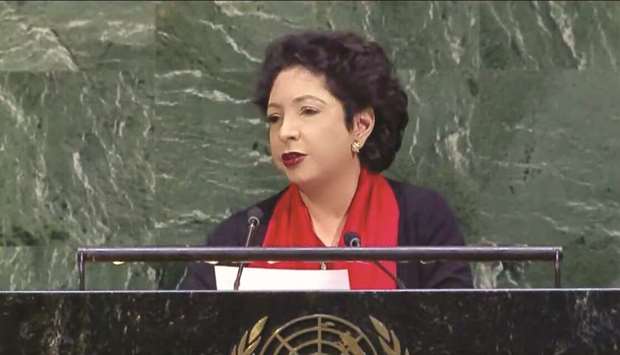Pakistan has thrown its weight behind the new UN Strategy and Plan of Action to combat hate speech, saying that language is being used to secure narrow political and electoral gains in many parts of the world, including the South Asian region.
“An inevitable consequence is to fan the flames of bigotry, intolerance, anti-Muslim hatred and xenophobia,” ambassador Maleeha Lodhi said after UN Secretary-General Antonio Guterres unveiled the strategy at a special meeting held in the packed United Nations Economic and Social Council (Ecosoc) chamber on Tuesday.
“My Prime Minister Imran Khan has recently again called for urgent action to counter Islamophobia, which is today the most prevalent expression of racism and hatred against ‘the other’,” the Pakistani envoy told ambassadors, senior diplomats and high-ranking UN officials.
The UN Strategy and Plan of Action provides a system-wide programme with the overriding objective of identifying, preventing, and confronting hate speech.
The UN secretary general said It targets “the root causes of hate speech”, pointing out that these include tackling violence, marginalisation, discrimination, and poverty, as well as bolstering weak state institutions.
While many of these are being addressed in the 2030 Agenda for Sustainable Development, the new strategy goes further by recommending a co-ordinated response, such as identifying users of hate speech.
Secondly, the strategy aims to enable the UN to respond to “the impact of hate speech on societies”, Guterres explained, including by bringing individuals and groups together who have opposing views; working with traditional and social media platforms; and developing communications guidance.
In her comments, Lodhi said: “We are fully committed to support the UN’s strategy on hate speech. This is a moment for all of us to come together to reverse the tide of hate and bigotry that threatens to undermine social solidarity and peaceful co-existence.”
The Pakistani envoy expressed the hope that the strategy and action plan would address the complex question of how to respond to intolerant, inflammatory and prejudiced narratives that were stoking racial and religious fears, and consequent hostility, saying that follow up will be critical.
In this regard, Lodhi called for government interventions to fight hate speech, including national legislation, and emphasised that social media platforms should not become conduits for incitement to violence and evolving ways to ensure that information technology companies were held accountable for the content that incited violence.
In addition, she called for framing a more focused strategy to deal with the various expressions of Islamophobia.
A “whole of government” and a “whole of society” approach is needed.
In this regard, Lodhi urged the UN secretary general to engage with a wide range of actors, including governments, civil society and social media companies, to take action and stop social media users being funnelled into online sources of radicalisation.
Adama Dieng, Special Adviser on the Prevention of Genocide, said that hate speech is a challenge from which “no country is immune”.

Lodhi: Islamophobia ... is today the most prevalent expression of racism and hatred against ‘the other’.
